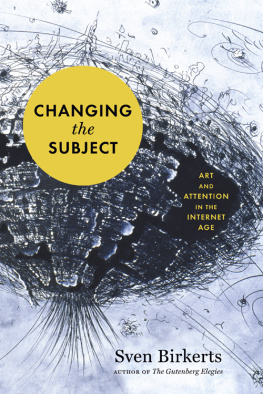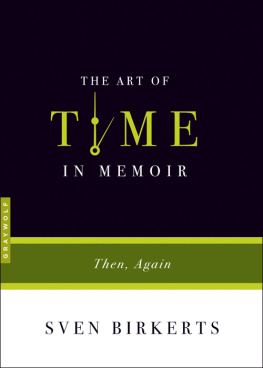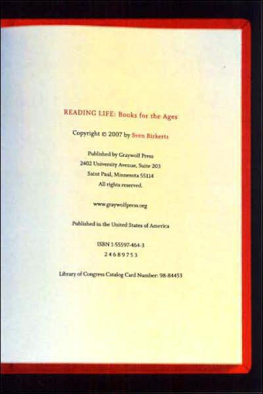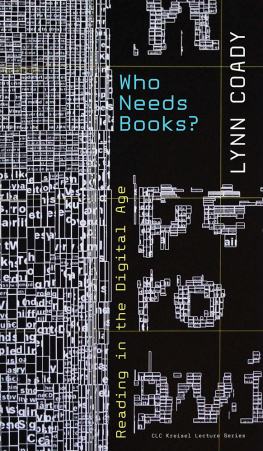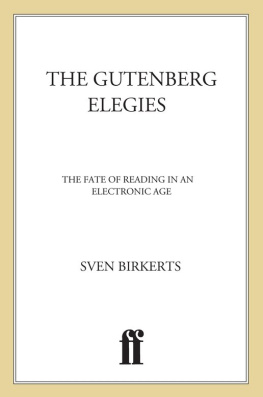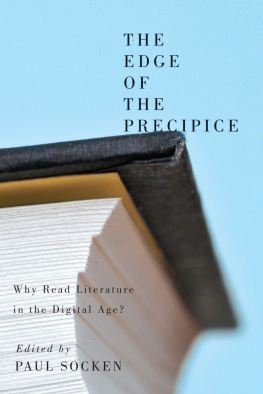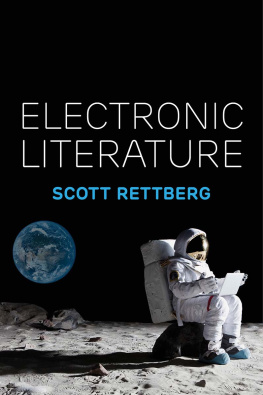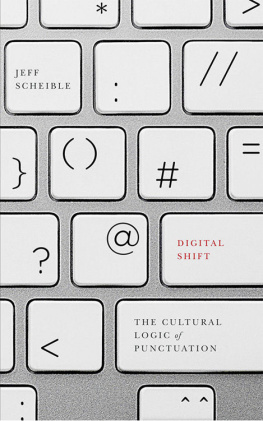CHANGING the SUBJECT
ART AND ATTENTION IN THE INTERNET AGE
Sven Birkerts
GRAYWOLF PRESS
Copyright 2015 by Sven Birkerts
This publication is made possible, in part, by the voters of Minnesota through a Minnesota State Arts Board Operating Support grant, thanks to a legislative appropriation from the arts and cultural heritage fund, and through a grant from the Wells Fargo Foundation Minnesota. Significant support has also been provided by Target, the McKnight Foundation, Amazon.com, and other generous contributions from foundations, corporations, and individuals. To these organizations and individuals we offer our heartfelt thanks.

Published by Graywolf Press
250 Third Avenue North, Suite 600
Minneapolis, Minnesota 55401
All rights reserved.
www.graywolfpress.org
Published in the United States of America
ISBN 978-1-55597-721-4
Ebook ISBN 978-1-55597-910-2
2 4 6 8 9 7 5 3 1
First Graywolf Printing, 2015
Library of Congress Control Number: 2015939975
Cover design: Kimberly Glyder Design
Cover art: Gerry Bergstein, Liftoff , 2004. Oil on paper.
Used with the permission of the artist.
For Gunnar and Sylvia, my parents.
CHANGING the SUBJECT
On or About
On or about December 1910, wrote Virginia Woolf with provocative imprecision, human character changed, an announcement that has become more famous than it maybe deserves to be. Woolf was referring to the then-recent postimpressionist exhibition in London, arguing for the power of art to remake consciousness, though of course we know, as Woolf knew, that no work or performance possesses that kind of power in itself. More likely human nature was already changing, and the shift in artistic style only attested to the fact. Though Woolfs words were meant to be an arresting journalistic gambit and should not be held historically accountable, the assertion does create a pretext. After all, where larger cultural mythologies are at issue, no one really cares what is objectively the casethere is no objectivity in a field vibrating with jostling subjectivities. The sentence is so often quoted because it expresses a buried collective wishfor marked-out moments of transformation; for large-scale unitary psychic events. And the wish is in many ways stronger than the skeptics main objection, which is that come what may, the mass of humanity continues on as it ever has; that nothingno cataclysm, certainly no exhibitionwill jolt it from the rails of the daily, from the unthinking placement of one foot in front of the other. But I dont think even the hardiest skeptic would deny that we also have a broad, nonspecific appetite for a certain kind of transformationa group swerve toward meaning that has to be related to the millenarian longings at the heart of revealed religions.
What I want to look at here is the idea of pervasive change, and the common perception of such change, and how shared perceptions themselves become accelerators and consolidators of transformation. I am trying to catch hold of something that is in many ways like one of those gases that are without color, odor, shape, or apparent substance, and are undetectable except by way of the effects they producean analogy that leads me with devious ease to my point of departure. Im talking about an event that was for me as much of an awakening in the Virginia Woolf sense as the far more disastrous World Trade Center attacks of 9/11, one that terrified me in that same primal way, driving home as no previous accounts of war or scientific breakthrough ever had, the knowledge that we are trapped inside of a huge system, one governed by forces we cannot control and that may bein this case they were essentially invisible.
My induction into the late-modern, or postmodern, age came on March 28, 1979, with news of the accident at the Three Mile Island nuclear facility in Middletown, Pennsylvania. On that day uninterrupted radio and television bulletins reported an unprecedented system collapse and the impending release of enormous quantities of radioactive materialenough, it was said, to contaminate the whole Eastern Seaboard. The drama threw me into a state of inner panic. I could not stop listening as, hour by hour, the situation developedthe crisis, the magnitude of its danger, the seemingly inadequate efforts at containment. I felt my own core in meltdown. And that terrifying intensity was the first thing I thought of on the morning of September 11, 2001, when the reports and images were coming at us one hard upon the nextof a city drowning in black smoke, of hijacked aircraft, of other possible targets. I was suddenly right back in that tiny room in Cambridge two decades earlier, listening to my battery-powered radio, monitoring the reported shape and distribution of the radioactive plume that for a long period looked to be headed up the eastern seacoast, likewise half-convinced that the apocalypse was finally at hand.
What I realized in those hours in my roomwhat I got in my gut in a way I never really had before, not even during the atom bomb anxieties of my childhoodwas that my assumption of the local, of the safe sovereignty of place, had been shattered. Something happening far away was very possibly going to change my lifeall our livesand that something was a power that was human-created, and invisible. Certainly those original nuclear paranoias had deeply shaken me, but for some reason they hadnt quite uprooted my worldview. Now I felt real change happening. Though everything out my window looked the same as it ever had, it was all made different by this new knowledge. Yesterdays tree, the parked cars, the neighbor boys biketheir positions were unchanged, but the air surrounding them was no longer the same.
TMIthat was the acronym by which Three Mile Island entered our lore: journalists wrote TMI as they now write 9/11 or Katrina, and everyone knew what it meant. Then years went by, the time of a half generation, and of course the terrifying recollection waned. Butand here is the sublime ironyas one sense of TMI gradually faded, another quietly arose to take its place. I remember that I was sitting at dinner just a few years back, all of us listening to my son, Liam, telling about something hed heard at school, giving account, when all at once his older sister, Mara, dramatically clapped her hands over her ears and said, TMI, TMI! Meaning, as she explained when she saw my confused expression, too much information. This latter meaning of the acronym has gone out to whatever linguistic boneyard old clichs go to, but for the opportunistic essayist looking to write about the inundation of our whole cultureour worldby data, and the transfiguration of our ways of living by information technologies, no coincidence of initials could be more apt. TMIit can be considered our new mantra. Too much information. But here I dont say it cutely or blithely, but rather with some of the dread attached to the earlier acronym, keeping the former sense like an etymological root. What I mean is that it fits; it resonates. The new information culture is also ominously systemic, invisible, and dispersed. It is changing us with such subtle uniformity of pressure that we hardly know were being changed, and this is unsettling in the extreme.

